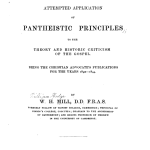Trump made headlines with an F-bomb in response to Israel-Iran strikes. Some clutched pearls—but does Trump’s foul language effing matter?

Last week, Trump used a swear word during an exchange with reporters. Referring to an exchange of strikes between Israel and Iran just before their ceasefire took effect, Trump stated that the two countries had been fighting “so long and so hard that they don’t know what the fuck they’re doing.” I’ll leave it to the pundits to discuss the geopolitics at play here. My interest is in the fact that his choice words made headlines. And in all the conservative Christian grannies clutching their pearls at his choice language. This linguistic outrage prompts the question: Does Trump’s foul language effing matter?
To that, I’ll answer that yes, Trump’s word choice matters. But not in the way you’d think. The morality of his word choice is irrelevant. What matters is the effect his words have on others. What matters are Trump’s disrespectful attitudes, which are evidenced by his selection of vocabulary. Here are three ways Trump’s words demonstrated disrespectful attitudes:
1. Disrespecting the Voters Who Put Him in Office
President Trump’s language displays a disturbing lack of respect, especially for the conservative Christian voter who helped him back into office. They have standards of decency that prevent them from using the worst kind of cuss words. And Trump’s verbiage made Christian grannies drop their jaws.
Not that these MAGA Christians would disagree with Trump on principle. Many of these salt-of-the-earth believers would never dream of using the kind of language that he used, but support his positions anyway. In fact, a good number embrace Trump’s ability to say whatever he thinks (something they wish they had the courage to do). The truth is, they’re a lot like Auntie Em from the Wizard of Oz, who said:
“Almira Gulch,… For 23 years, I’ve been dying to tell you what I thought of you, and now… well, being a Christian woman, I can’t say it!”
Hypocritically, they won’t use the words, but they’ll think the thoughts. Many Christians who would never use such language themselves silently cheered when Trump blurted what was on his mind.
Don’t get me wrong—I’m not anti-F-word. In my article, “Does Cussing Make You a Sinner, a Hypocrite, or Just More Real?”, I support the idea that there’s nothing inherently wrong with what we consider “swear words.” And I let the F-word fly on a regular basis. But when I was a pastor, I sure didn’t say it in front of the Sunday school teachers. It’s called respect. Even if they are hypocrites, they’re the ones who put him into office, and he should try to avoid pissing them off.
2. Disrespecting Other Nations
Trump’s words do more than disregard the values of conservative Americans. They also insult the nations he’s talking about. Trump prides himself on being a peacemaker (a dubious claim). By using words like this, he demonstrates his disregard for the diplomacy for which his voters elected him. You can’t sit at a bargaining table, shake hands with everyone, pretend you regard them as equals, and use that kind of language about them, once their backs are turned. By choosing this language, Trump demonstrates how he really feels about other nations.
When the President of the United States talks like a playground bully, it diminishes our credibility on the world stage. Rather than using his words to de-escalating tensions, Trump chooses language to make himself look bigger and everyone else smaller.
Words matter. They are not idle expressions. Especially when you’re the President, you must choose them wisely.
3. Disrespecting the Office of the Presidency
Trump’s word choice disrespects the dignity of his own office. As I wrote in “Inaugural Address: What Is Trump Not Telling You?”, the President isn’t just a person—he’s a symbol. He’s supposed to represent the voice and the values of a nation. Instead of reaching for respectful words, he employed vicious verbiage that made him look less presidential and more like an intimidator.
Defending their hypocritical choice at the voting booth, Trump’s Christian supporters famously say, “We elected him as President, not as pastor.” But during the worst of times, U.S. presidents are called upon to offer comfort, wisdom, consolation, understanding, respect, and leadership to a hurting world. Trump’s F-bomb explodes like a landmine designed to divide, dominate, and shame people into submission. And that is a much greater problem than any expletive.
The F-Bomb Isn’t the Problem
Let me be clear. While Trump’s foul language is a problem, the F-bomb isn’t the real issue. These days, I think everybody except conservative Christians have evolved in how we understand the things that make language foul. As I unpacked in “Cussing, Swearing, Cursing: Do Words Really Matter?”, four-letter words are not inherently sinful. They’re just cultural constructs. These expressions are indicators of strong emotion, frustration, or emphasis. Jesus didn’t police people’s vocabulary. But he did ask them to monitor their hearts.
In biblical times, cursing wasn’t about the syllables and sounds you made with your mouth. It was about whether you used your words to hurt or to heal, to uplift or to destroy. That’s what I explored in “Foiled Again: Blessings and Curses in the New Testament”: real profanity is spiritual. It’s what happens when words are used to diminish, exclude, and condemn. And that’s where Trump crosses the line—again and again.
The Real Profanity
The real obscenities aren’t the swear words. They’re the dehumanizing words. When he mocks people with disabilities, calls immigrants “animals,” speaks of women in sexually demeaning ways, denies the existence of trans folks, and calls protestors “vermin,” Trump might refrain from using traditional cuss words. But his words do far more damage than anything that may have gotten your mouth washed out with soap as a kid. With this kind of language, Trump reinforces a pattern of contempt for anyone who falls outside his grasp of power. And those who look to him for guidance learn to do the same.
As I wrote in “Trump Is Not the Antichrist, But Still Is Anti-Christ”, the US President’s language consistently rejects the ethic of Christ—which centers love, dignity, and humility. Jesus never used such Trumpish language to describe his enemies. Instead, Jesus said we should love them. Christians should never approve of someone who uses such violent, hateful, and malicious talk. And those who follow Christ should never look to the example of someone who uses this kind of language, either.
Words That Wound
In “Can Christians Curse?”, I noted how Christians often mistake manners for morality. But the call of Christ isn’t an invitation to mere politeness. Instead, Christ’s way of love demands something much more difficult and demanding. It requires that we speak up for the vulnerable, defend the weak, empower the powerless, and lift up the fallen.
Trump’s language tends to do the opposite. In Jesus and John Wayne: How White Evangelicals Corrupted a Faith and Fractured a Nation, author Kristin Kobes Du Mez highlights conservative Christianity’s fetish for toxic masculinity. While Jesus represents the incarnation of love, kindness, respect, goodness, and grace, Trump follows The Duke’s example of pistol-whipping your enemies, force-kissing women and then doing it again when they slap you, and saying anything you want, just to make a point. But these words can wound just as surely as bullets from a six-shooter.
Trump’s language may sound tough, but it’s spiritually toxic. As it normalizes hatred and causes cruelty to come from the lips of professing Christians. Through his words, Trump has turned the hearts of those who call themselves believers and deceived even “the elect.” If people of faith stand silently by and allow such things to go unchecked, then we become complicit and therefore guilty ourselves. Instead of words that wound, it’s time we used our lips to heal.
Does Trump’s Foul Language Effing Matter?
So, does Trump’s foul language matter? You better believe it does. Not because he swears—but because he curses. Not because he causes sensitive souls to clutch their pearls in horror, but because he curses the very essence of some people’s beings. It doesn’t effing matter that Trump breaks etiquette. It does matter that he breaks people.
If you’re a person of faith, or simply a person who believes in the power of words, it’s time to quit focusing on things as superficial as the fact that Trump dropped the F-bomb. (Presidents and other leaders have been doing that behind closed doors for generations.) It’s Trump’s real bombs that take people’s lives and dehumanizing words that kill people’s souls that we should be worried about.
It’s time we expected more from our leaders. But this can only happen if we expect more from ourselves. Because don’t forget—We the People choose our leaders. Let’s remember that it’s not we who must follow the example of a king’s speech. Instead, We the People get to determine the things our elected leaders can get away with saying.
For related reading, check out my other articles:
- Inauguration: Donald Trump Claims Divine Power
- Should US Presidents Believe in a Higher Power?
- Trump’s Shooting: Is Political Violence Ever Justified?













